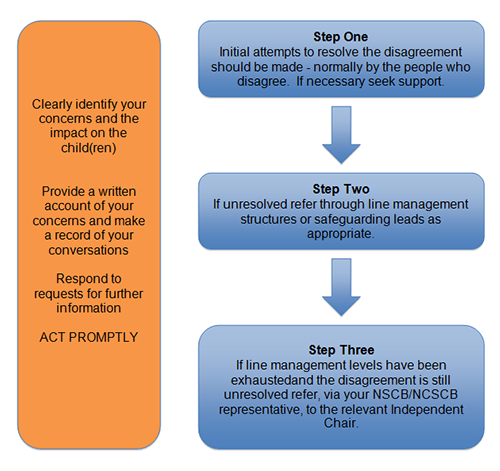Conflict Resolution Policy
Problem resolution is an integral part of interagency working to safeguard children. It is often a sign of developing thinking within a dynamic process and can indicate a lack of clarity in current procedures or approach. Professional disagreement is only dysfunctional if not resolved in a constructive and timely fashion.
Effective working together depends on an open approach and honest relationships between agencies and a commitment to genuine partnership working. As part of this there needs to be a system in place to enable disagreements to be resolved to the satisfaction of practitioners and organisations involved. The aim should be to resolve difficulties at practitioner level between organisations, where this is possible, but where not the disagreement should be escalated until a resolution is achieved. Disagreements should not be left unresolved.
Disagreements could arise in a number of areas, but are most likely to arise around thresholds, roles and responsibilities, the need for action and communication.
It is important:
- To avoid professional disputes that put children at risk or obscure the focus on the child;
- To resolve difficulties (within and) between organisations quickly and openly;
- To identify problem areas in working together where there is a lack of clarity in existing procedures and to promote resolution via necessary amendments.
Throughout any dispute between individuals or organisations practitioners must remain child focused. The safety of individual child(ren) remain the paramount considerations.
With any dispute about thresholds, please refer to the appropriate pathway documents (Family Support Pathway in the City, Pathway to Provision in the County) to help articulate your concern.

Step One
Initial attempts should be taken to resolve the problem. This should normally be between the people who disagree. It should be recognised however that differences in status and/or experience may affect the confidence of some practitioners to pursue this unsupported. Practitioners should consult with their line manager or practitioner lead as appropriate.
Step Two
If unresolved the problem should be referred to the practitioner's own line manager or their organisations safeguarding children lead, who will discuss with their opposite number in the other agency. At this stage it may be useful for the line managers/safeguarding children leads to agree a meeting between themselves and the concerned practitioners to assist with the exploration of the problem.
If the problem remains unresolved the line managers will refer to their line managers for consideration. This process will continue until a resolution can be found.
Note: some organisations may not have a defined line management structure and in these circumstances the practitioner with concerns about an unresolved disagreement should take responsibility for raising their concerns through the line management structure in the other agency.
Step Three
In the rare circumstances where the problem cannot be resolved through line management arrangements, the matter will be referred to the Chair of the Safeguarding Children Partnership (SCP) who will offer mediation. Ideally, there agency representative on the relevant SCP will contact the Independent Chair and inform the Partnership Manager of this action. Where felt appropriate, a mediation meeting will be set up involving as a minimum the SCP Chair, the respective organisations Partnership representatives and the SCP manager.
A clear record should be kept at all stages, by all parties. In particular this must include written confirmation between the parties about an agreed outcome of the disagreement and how any outstanding issues will be pursued.
When the issue is resolved, any general issues should be identified and referred to the agency's representative on the SCP for consideration by the appropriate Local Safeguarding Children Partnership (LSCP) panel or group to inform future learning.
It may also be helpful for individuals to debrief following some disputes in order to promote continuing good working relationships.
The timescale within which the processes set out above should take place will be dependent on the nature of the disagreement and what this may mean for the safety of the child. In some circumstances immediate action will be merited and progress through agency line management routes will need to take place within 1 working day and, in circumstances where there continues to be disagreement, the issue will be brought to the attention of the Independent Chair the following working day. In less urgent cases the whole process should be completed within no more than 4 weeks.
When trying to resolve professional disagreements remember to:
- Clearly identify your concerns;
- Describe the impact on the child(ren);
- Set out what work has already been undertaken;
- Put all of the above in writing and provide it to the other agency and record details of conversations;
- Be responsive to obtaining/providing any additional information requested.
Last Updated: July 15, 2024
v8